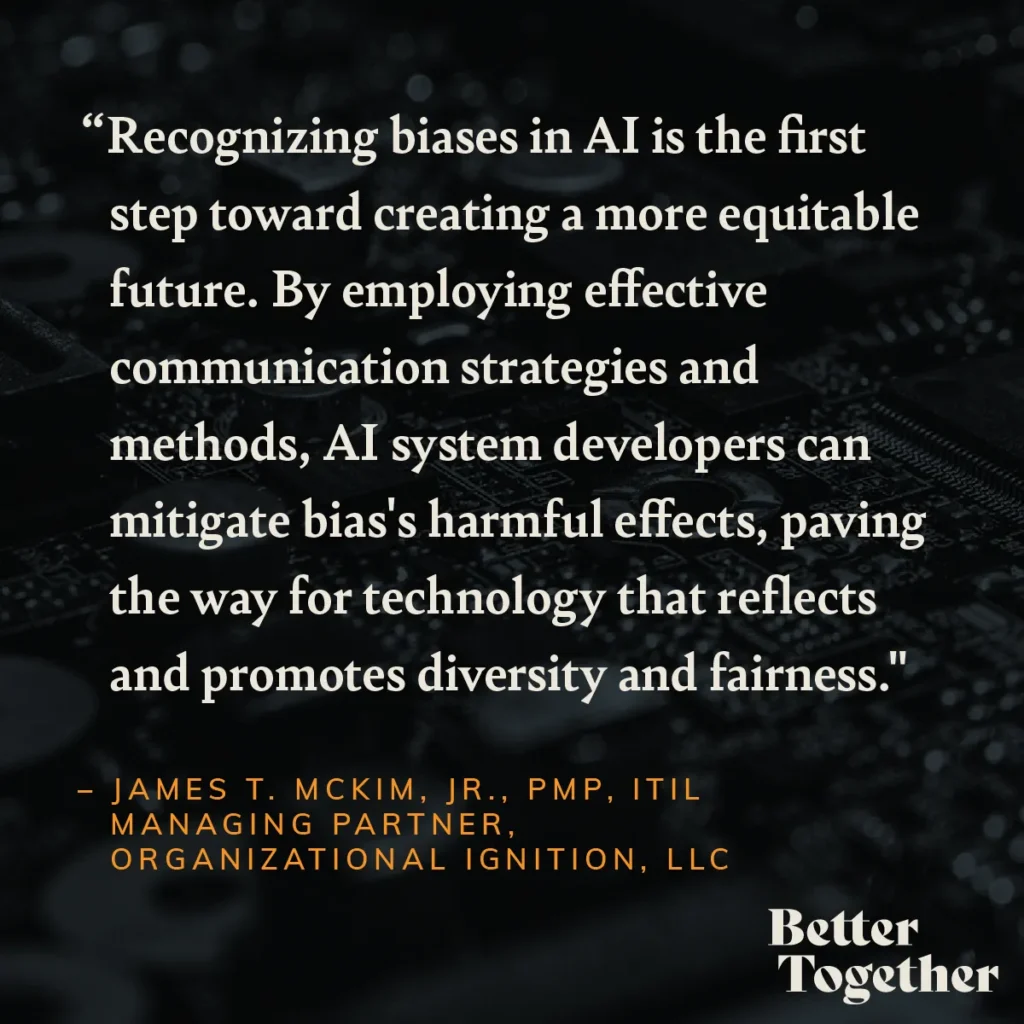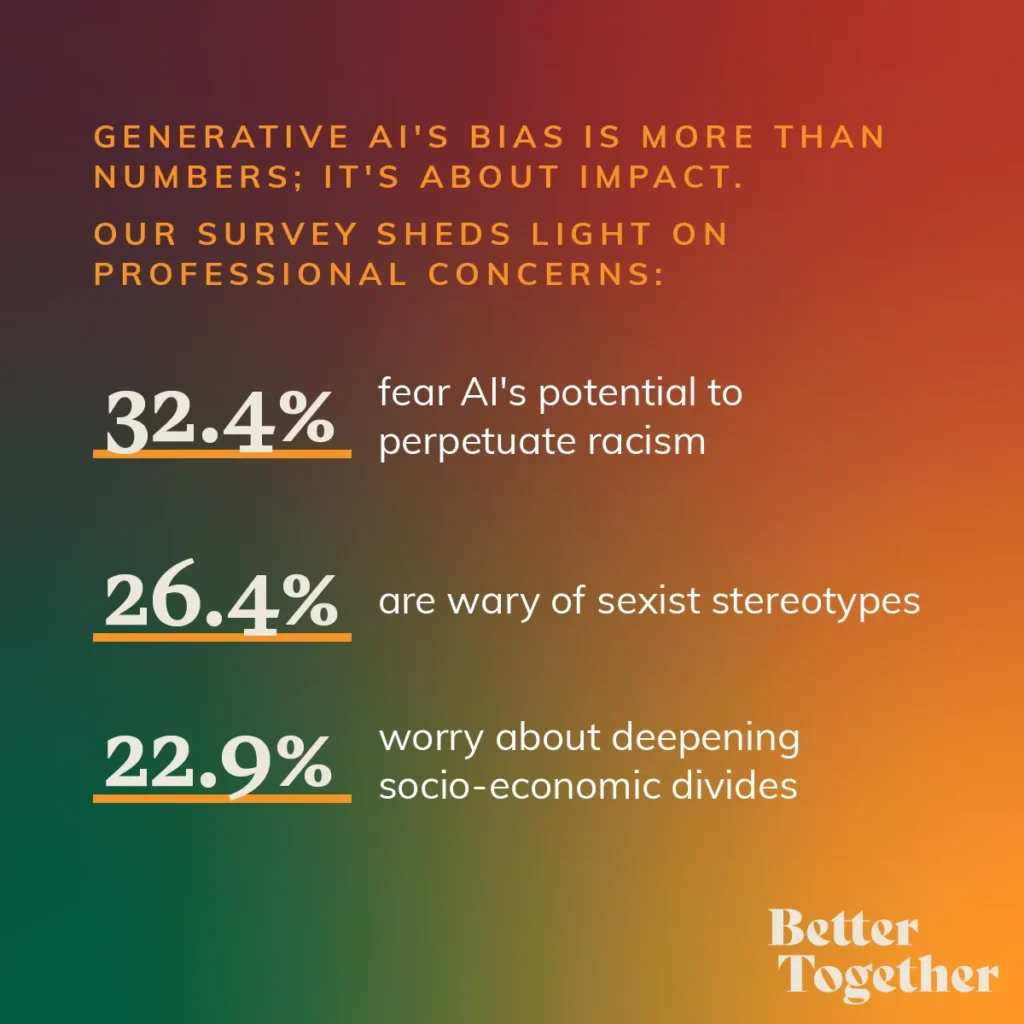By: Catharine Montgomery, Founder and CEO of Better Together
Every technological innovation holds a mirror to the society that creates it. What does it reveal about us when the reflections we see continue to perpetuate the biases and divisions we’ve been striving to overcome for generations?

My journey to founding Better Together was shaped by numerous personal encounters with racism — experiences that challenged my perceptions and influenced my agency’s mission. Whether it was deciding to leave a job due to the presence of a racist colleague, being stared at in Boston for living in the “wrong” neighborhood (cough, Back Bay, cough), or confronting the biases I was naive to, but grew up with everyday life while living in rural Alabama, although I didn’t know it at the time, each instance was teaching me why and how to fight for equity.
The moment I realized that generative AI could either exacerbate or help rectify racial inequities, it marked a pivotal moment in my life. I remember waiting in a long line at the Atlanta airport and taking that time to be productive, which meant reading McKinsey’s “The Impact of Generative AI on Black Communities” report. According to the company report, generative AI can widen the racial wealth gap by $43 billion each year, but if implemented thoughtfully, it has the power to dismantle numerous barriers for undersupported communities. This dual potential of generative AI was the starting point of my commitment to influencing how this technology is developed and applied.

Better Together’s nationwide survey on biases in generative AI uncovered some common trends. While 77.24 percent of respondents were familiar with what generative AI is, many expressed concerns about embedded racism, sexism and classism.
- Racism in Generative AI: Racism concerns were noted equally across genders and were pronounced in younger adults and middle-aged groups, indicating cross-generational anxiety about generative AI’s role in perpetuating racial biases.
- Sexism in Generative AI: Concerns about sexism were prevalent among younger respondents, especially those 18 to 29, highlighting generational differences in perceptions and expectations of technology.
- Classism Concerns in AI: Respondents voiced fears that generative AI exacerbates socio-economic disparities highlighting the risk that AI technology disproportionately benefits already advantaged individuals, deepening existing divides.
These issues point to a broader societal challenge and show the critical need for an ethical approach to AI development. We all know that unconscious biases aren’t new, but the biases in generative AI aren’t new either.
Here’s how we move from identifying problems to creating solutions: the survey results are not data points, they’re a roadmap for developing AI technologies that truly embrace inclusivity and equity. At Better Together, we use these insights to guide corporations and policymakers in creating AI tools that are keenly aware of their social impacts.
Addressing biases in AI involves more than just adjusting algorithms; it requires a profound shift in the cultural approach to technology development. We advocate for forming diverse development teams, implementing bias mitigation protocols and continuous public engagement to ensure that AI serves the common good.
The mission of Better Together is personal. I have felt the sting of biased assumptions and seen how easily they can be encoded into systemic racism. But I have also witnessed the power of collective action and the potential for technology to be a force for good.
This moment in the evolution of AI is critical. We have the opportunity — and perhaps the responsibility — to steer this technology toward a future that amplifies the best of our collective capabilities, not the biases that divide us. Our survey underscores the urgent need for collaboration across all sectors to ensure that generative AI technologies reflect the diversity and richness of our society.
By confronting these issues head-on, sharing our findings, and engaging in informed discussions, we can ensure that generative AI enhances our understanding of the world rather than distorting it. Join us at Better Together as we work to ensure that the future of AI is as diverse as the world it serves.
Let’s continue to push the boundaries of what AI can achieve when it’s developed with an unwavering commitment to justice and equity. Your voice and action are crucial as we shape a technology landscape that upholds our shared values of fairness and inclusivity.


